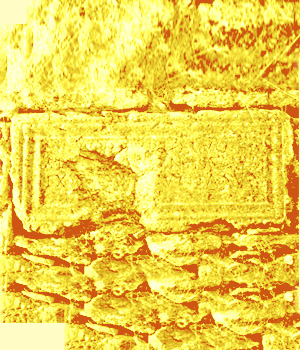Carved for Eternity – A Dedication to Mercury from Rapperswil, Bern
Inscriptions are a valuable source when studying human history. The oldest documents come from antiquity. They were often created to memorialize past achievements and deceased individuals, as a public representation of prominent individuals, or as a votive text for the gods.
The study of inscriptions in stone, metal, wood, leather, or ceramic is referred to as epigraphy. Latin inscriptions represent an excellent source on the social and economic history of Roman times, but also for political structures and daily life – over 500,000 of them survive today. Every year, new findings and new readings are published. The research project for Roman inscriptions in Switzerland at the Historical Institute at the University of Zurich has contributed to that as well. The inscription below, which was dedicated to Mercury, was built into a supporting wall in the old rectory in Rapperswil. It was documented in 2011 as part of the research project. It reads:
Mer[c]urio Aug(usto) S(extus) V[al(erius) ---]anincanus ex v[oto pe]cunia sua [feci]t. Sextus Valerius [---]anincanus built this monument in honor of Mercury Augustus following a solemn vow and at his own cost.
Based on comparisons made with similar dedications, the gaps in the text due to the broken-off parts of the block could be filled in. The god Mercury played a particularly important role in trade. Sextus Valerius dedicated a statue to him, for which the limestone block seen here served as a base. The inscription was an opportunity for the person who made it to immortalize his name not only in front of the god, but also in front of the society – a cultural practice brought to Switzerland by the Romans.
Yannick Baldassare is Assistant at the institute of Ancient History and also participates in the research project. More
Anne Kolb is Professor of Ancient History with a focus on epigraphy, and she heads the research project on Roman inscriptions in Switzerland. More
Nikolas Hächler is a Research Assistant in the Ancient History section of the Historical Institute at the University of Zurich. More
Dr. Jens Bartels is Senior Assistant at the institute of Ancient History and also participates in the research project. More
Related contributions
